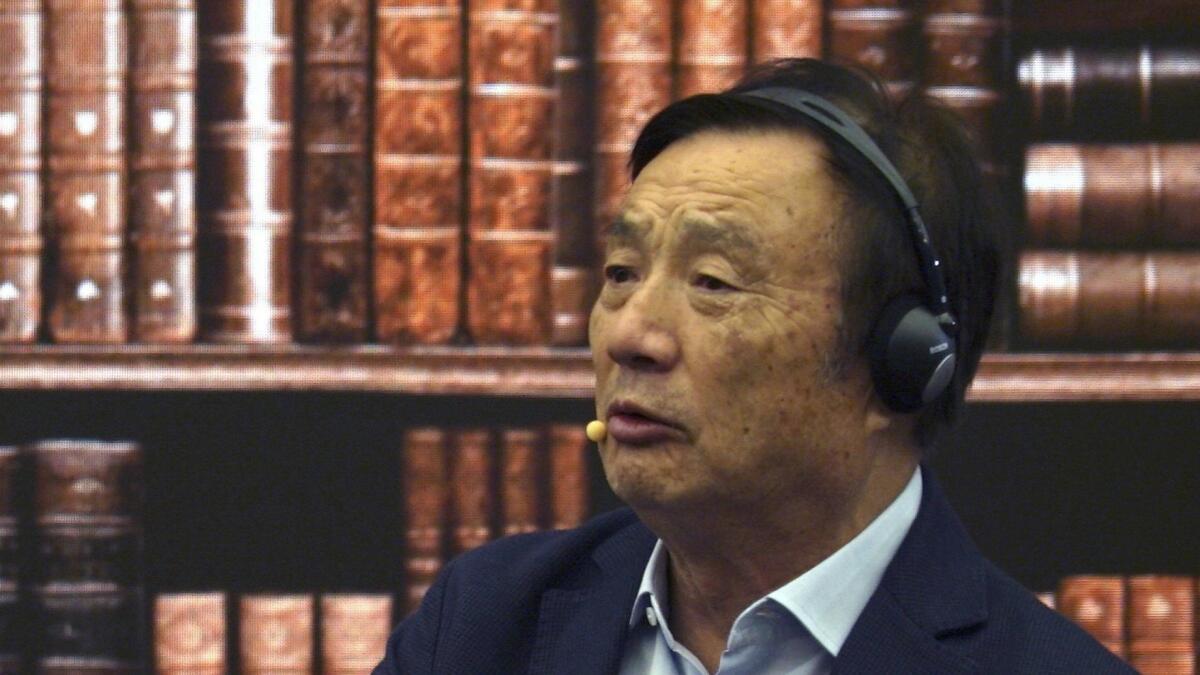Huawei says Trump’s ban might cost it $30 billion of sales

Huawei Technologies Co. founder and Chief Executive Ren Zhengfei expects U.S. sanctions to curtail his company’s revenue by about $30 billion over the coming two years, wiping out the Chinese networking giant’s growth by withholding crucial U.S. technology.
Sales at China’s largest technology company will likely remain stagnant at about $100 billion in 2019 and 2020, the billionaire said during a panel discussion, quantifying for the first time the hit from a plethora of restrictions imposed by the Trump administration.
Huawei, however, will aim to maintain its research and development budget and refrain from layoffs or major asset sales. The sale of a majority slice in Huawei Marine — announced in June — was a business decision that was unrelated to America’s campaign against the company, the 74-year-old CEO added.
Ren said Monday that he was surprised at the extent to which Washington has attacked his corporation. Huawei is said to be preparing for a fall of as much as 60% in overseas smartphone shipments, as Alphabet Inc.’s Google cuts it off from Android updates and apps such as Gmail and Maps. Ren has conceded that Trump administration curbs will cut into a two-year lead Huawei has painstakingly built over rivals such as Ericsson and Nokia.
“We didn’t expect the U.S. would so resolutely attack Huawei. We didn’t expect the U.S. would hit our supply chain in such a wide way — not only blocking the component supplies, but also our participation in international organizations,” Ren told the panel in a broadcast from Huawei’s home city of Shenzhen. “That will make our revenue for this and next year around $100 billion.”
Ren has struck a defiant tone in the face of U.S. sanctions that threaten his company’s very survival. At the heart of Trump’s campaign is suspicion that Huawei helps China’s government in espionage while spearheading China’s ambitions to become a technology superpower. It has been accused for years of stealing intellectual property in lawsuits filed by American companies including Cisco Systems Inc., Motorola and T-Mobile US Inc. Critics say such theft helped Huawei vault into the upper echelons of technology — but Ren has laughed off that idea.
On May 17, the United States blacklisted Huawei and cut it off from the U.S. software and components it needs to make its products. The ban hamstrings the world’s largest provider of networking gear and No. 2 smartphone vendor just as it was preparing to leap to the forefront of global technology. It is rocking chipmakers from America to Europe as the global supply chain comes under threat. The ban could also disrupt the rollout of 5G wireless globally, undermining a standard that is touted as the foundation of autonomous cars, robot surgery and more.
But Huawei has also said it will ramp up its own chip supply and find alternatives to keep its edge in smartphones and 5G. The company today generates more sales than internet giants Alibaba Group Holding Ltd. and Tencent Holdings Ltd. combined. Last year Huawei overtook Apple Inc. in smartphone sales, a triumph that burnished Ren’s tech credentials.
“We didn’t expect the damage to be this serious. We did make some preparations,” Ren told author-investor George Gilder and MIT Media Lab founder Nicholas Negroponte, who both agreed the United States was making a mistake in singling out Huawei.
Ren, who endured Mao Zedong’s great famine and founded Huawei in 1987, has said Huawei will do whatever it takes to survive. He has gone from recluse to media maven in the span of months as he fights to save the $100-billion company he founded. He emerged from virtual seclusion after his eldest daughter — Meng Wanzhou, who is the company’s chief financial officer — was arrested as part of an investigation of Huawei.
Ren has since become a central figure in a U.S.-Chinese conflict that’s potentially the most important episode to shape world affairs since the collapse of the Soviet Union. As Ren said in January, when the world’s biggest economies battle for dominion, nothing in their way will survive. His company is a “sesame seed” between twin great powers, he has said.
The chief executive has had much to deal with of late. His company finds itself under fire, besieged by a U.S. effort to get key allies to ban its networking equipment. The U.S. assault helped crystallize fears about Huawei’s growing clout in areas from wireless infrastructure and semiconductors to consumer gadgets.
Then came the blacklist. Huawei appears to have anticipated this possibility since at least mid-2018, when similar sanctions threatened ZTE Corp. Huawei is said to have stockpiled enough chips and other vital components to keep its business running at least three months. On Monday, Ren said that Huawei doesn’t implant backdoors in its products and that it remains willing to sign a “no-backdoor agreement” with the world if necessary.
“We will be reborn by 2021,” Ren said.
More to Read
Inside the business of entertainment
The Wide Shot brings you news, analysis and insights on everything from streaming wars to production — and what it all means for the future.
You may occasionally receive promotional content from the Los Angeles Times.










